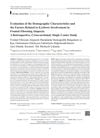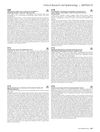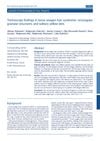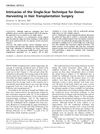Search
for
Sort by
Research
600-630 / 1000+ resultsresearch Efficacy of Autologous Cell-Based Therapy for Male and Female Pattern Hair Loss Using Dermal Sheath Cup Cells: A Single Arm, Multi-Center, Confirmatory Clinical Study
Autologous cell-based therapy using dermal sheath cup cells may help treat pattern hair loss, especially in women.
research Finasteride for Androgenetic Alopecia Is Not Associated with Sexual Dysfunction: A Survey-Based, Single-Centre, Controlled Study
Finasteride does not cause sexual dysfunction in men with hair loss.
research Comparison of the Efficacy of 15% Minoxidil with Low Level Laser Therapy in Treatment of Patients with Androgenetic Alopecia: A Single Blind Randomized Clinical Trial
Both treatments improved hair loss, but 15% Minoxidil caused more side effects than Low Level Laser Therapy.
research Finasteride for Androgenetic Alopecia Is Not Associated with Sexual Dysfunction: A Survey-Based, Single-Center, Controlled Study
Finasteride does not cause sexual dysfunction in men with hair loss.

research A Keratinocyte-Specific Epoxygenase, CYP2B12, Metabolizes Arachidonic Acid with Unusual Selectivity, Producing a Single Major Epoxyeicosatrienoic Acid
CYP2B12 enzyme in skin cells converts arachidonic acid into specific bioactive lipids.
research Maintenance, Withdrawal, and Re-Treatment with Ritlecitinib and Brepocitinib in Patients with Alopecia Areata in a Single-Blind Extension of a Phase 2a Randomized Clinical Trial
Continuous treatment with ritlecitinib and brepocitinib is needed to maintain hair regrowth in alopecia areata.
research Efficacy of Cetirizine 1% Versus Minoxidil 5% Topical Solution in the Treatment of Male Alopecia: A Randomized, Single-Blind Controlled Study
Cetirizine 1% helps hair growth in men with no major side effects, but minoxidil 5% works better.

research Efficacy of QR678 Neo Hair Growth Factor Formulation for the Treatment of Hair Loss in COVID-19-Induced Persistent Telogen Effluvium: A Prospective, Clinical, Single-Blind Study
QR678 Neo® hair growth treatment is effective for hair loss caused by Covid-19.
research Fixed, Low Radiant Exposure vs. Incremental Radiant Exposure Approach for Diode Laser Hair Reduction: A Randomized, Split Axilla, Comparative Single-Blinded Trial
Both fixed and incremental laser treatments effectively reduced underarm hair, but the fixed method was less painful.

research Real-World Experience and Long-Term Evaluation of Tofacitinib in Refractory Alopecia Areata: A Prospective, Open-Label, Single-Center Study in Asian Arab Population
Tofacitinib is a promising treatment for severe alopecia areata, with many patients experiencing complete or partial hair regrowth.
research Efficacy and Safety of 5% Minoxidil Alone, Minoxidil Plus Oral Spironolactone, and Minoxidil Plus Microneedling on Female Pattern Hair Loss: A Prospective, Single-Center, Parallel-Group, Evaluator-Blinded, Randomized Trial
Combining minoxidil with microneedling or spironolactone is more effective for female hair loss than using minoxidil alone.

research Evaluation of the Safety and Effectiveness of Intradermal Administration of QR678 Neo Hair Growth Factor Formulation: A Phase-IV, Open-Label, Single-Arm Multi-Ethnicity Clinical Trial
QR678 Neo® is a safe and effective treatment for hair loss in men and women.
research Efficacy, Tolerability, and Safety of Montelukast Versus Finasteride for the Treatment of Moderate Acne in Women: A Prospective, Randomized, Single-Blinded, Active-Controlled Trial
Finasteride is more effective and satisfactory than montelukast for treating moderate acne in women.

research Studies on the Disposition of Finasteride: Absorption, Distribution, and Excretion of (14C)finasteride After Single Oral or Intravenous Administration in Rats
Finasteride has different absorption and metabolism in male and female rats, with higher concentrations in certain organs and mostly excreted through feces.

research A Phase I, Open-Label, Sequential, Single-Dose Clinical Trial to Evaluate the Pharmacokinetics, Pharmacodynamics, and Safety of IVL3001, a Finasteride-Based Novel Long-Acting Injection for Androgenetic Alopecia
IVL3001 is safe, effective, and better than oral finasteride for treating hair loss.

research Effectiveness and Safety of Baricitinib in Patients With Moderate-to-Severe Refractory Alopecia Areata in Real World: An Open-Label, Single-Center Study
Baricitinib effectively and safely improves hair growth in patients with severe alopecia areata.

research Efficacy and Safety of Fractional CO2 Laser Combined with Halometasone Cream for Treatment of Moderate-to-Severe Chronic Hand Eczema: A Prospective, Single-Center, Parallel-Group, Open-Label Randomized Trial
Using fractional CO2 laser with halometasone cream works better for chronic hand eczema than just the cream, improving symptoms and quality of life with fewer relapses.

research Efficacy and Safety of Proxalutamide in Severe or Critically Ill COVID-19 Patients: Study Protocol for an Exploratory Trial
The trial will test if proxalutamide is safe and effective in reducing death in severe COVID-19 patients.

research A Novel Hand-Held Low-Level Light Therapy Device for the Treatment of Acne Vulgaris: A Single-Arm Prospective Clinical Study
A new hand-held light therapy device was found to be safe and effective for treating mild-to-moderate acne.

research Evaluation of Demographic Characteristics and Factors Related to Eyebrow Involvement in Frontal Fibrosing Alopecia: A Retrospective, Cross-Sectional, Single Center Study
Eyebrow loss in frontal fibrosing alopecia is common and may be linked to other health issues.

research Clinical Features, Etiologic Factors, Treatment, and Comorbidities of Palmoplantar Pustulosis: A Retrospective Single-Center Study
Smoking and certain health conditions like thyroid disease may make palmoplantar pustulosis harder to treat.
research Determining the Relationship Among Cattle Genotype, Hair Coat Score, and Productivity Through the Investigation of Single Nucleotide Polymorphisms Within Prolactin, Dopamine Receptor D2, and Melatonin Receptor 1A

research Comparative Study of the Efficacy of Finasteride 1 mg/day on Different Age Groups with Androgenetic Alopecia Using Phototrichogram Analysis: A Single-Center Retrospective Analysis
Finasteride 1 mg/day effectively treats hair loss in men aged 18-41 and over 41; DEET lotion works better than herbal insect repellents; combined tattoo removal technique shows no extra benefits.

research Wound Healing: A Cellular Perspective
The document concludes that better targeted treatments are needed for wound healing, and single-cell technologies may improve cell-based therapies.

research Blimp1+ Cells Generate Functional Mouse Sebaceous Gland Organoids In Vitro
Single Blimp1+ cells can create functional sebaceous gland organoids in the lab.

research Trichoscopy Findings in Loose Anagen Hair Syndrome: Rectangular Granular Structures and Solitary Yellow Dots
Rectangular black granules, solitary yellow dots, and mostly single-hair follicles suggest Loose Anagen Hair Syndrome.

research Mapping Human Skin: One Sequenced Cell at a Time
The article concludes that creating a detailed map of normal human skin at the single-cell level is important.
research Dermoscopy Study of Androgenic Alopecia in Men
Dermoscopy shows that varying hair shaft thickness and single hair follicles are main signs of male pattern baldness, especially in the fronto-temporal region.

research Commentary
The commentary suggests that using a single-scar technique for hair transplants can give good cosmetic results, but some surgeons hesitate to use it despite ways to address their concerns.